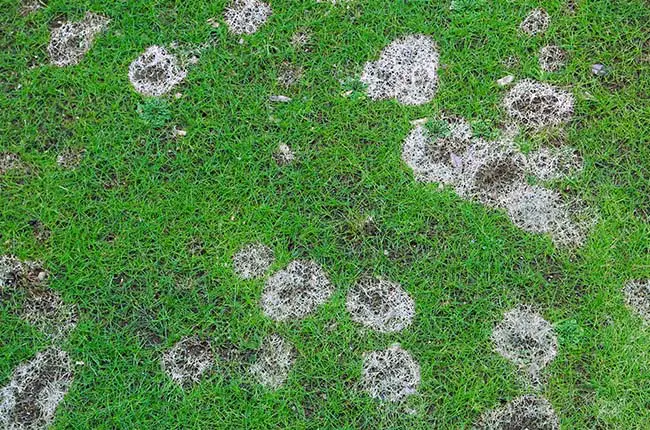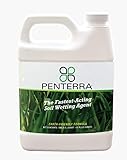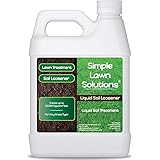If your lawn pools water and has brown spots even after getting plenty of water, chances are the soil is hydrophobic or water-repellant. A quick way to help water penetrate into the soil is to use a soil-wetting agent.
The best soil-wetting product is one that fixes the root of the problem by breaking down the compacted soil organically using beneficial microbes, instead of using a synthetic surfactant to only reduce water surface tension. It should not require lawn aeration before use and has added plant minerals as a bonus to improve soil fertility.
In this article, we will review 7 most popular soil-wetting products (4 organic and 3 synthetic) and explain which one(s) is or are the best.
Quick Summary
Soil Wetting Agents | Review |
Editor’s Pick Liquid lawn aerator (Covington Naturals) | Pros: Organic: uses microbes to improve soil structure Contains natural fertilizers to improve soil health High customer ratings Cons: None |
Thatch buster | Pros: Organic: contains beneficial microbes to break down compacted soil Can apply directly without lawn aeration prior use Cons: None |
Penterra | Pros: Proven to be effective with brown spots and hydrophobic soil. Cons: Not transparent about active ingredients Can be too strong for delicate plants and young grass |
Yucca Wet | Pros: Contains saponins as the natural surfactant Effective Cons: |
Simple Lawn Solutions | Pros: Contains Ammonium Lauryl Sulfate as surfactant. Proven results after a few applications. Safe to use around plants. Cons: Ingredients similar to shampoo |
Coco Wet | Uses a biodegradable chemical to reduce water surface tension Cons: Small bottle |
Organic Liquid Humic Acid (GS plant food) | Pros: Completely organic. Contains humic and fulvic acid, that have been scientifically proven to remediate hydrophobic soils. Cons: None |
What makes a good soil-wetting agent?
There are generally two kinds of soil-wetting products on the market.
The conventional kind contains surfactants that reduce the surface tension of water, allowing water molecules to penetrate through hydrophobic (water-repellant) soil which has hardened into a crust. It is a quick fix to the problem of water-repellant soil.
The surfactants used in these products are generally Polyacrylamides or Ammonium Lauryl Sulfate (which is also the active ingredient found in commercial shampoos). Both of these chemicals are synthetic chemicals produced from petroleum.
This can be a concern for those with children and pets who like to spend time on the lawn. Some products contain the natural surfactant of saponins, found in the roots of the Yucca plant. The problem with using surfactants is that they can change the pH of the soil and thus disturb healthy microbes and plant growth. Finally, the effect of surfactants is best seen when combined with lawn aeration before application, which can be considered a hassle for most gardeners.
The other type of soil-wetting product does not contain surfactants. Rather, they contain billions of beneficial microbes to break down the coating of organic acids around the soil particles which have cemented together like a hardened crust.
This type of wetting agent is more superior because it is not a quick fix to the problem by reducing water tension, but addresses the root problem and improves soil structure. Also, it does not require lawn aeration prior to use.
Best wetting agent for lawns
1. Liquid lawn aerator (Covington Naturals) – Editor’s Pick
Verdict: 5/5

The soil-wetting product by Covington Naturals is the Editor’s pick.
This is a unique, organic product as it contains beneficial microbes rather than synthetic surfactants to address the root of the problem with hydrophobic soil.
Instead of thinning the water using a surfactant, this product uses microbial activities to break down the organic acid coating around the soil particles and help loosen up compacted soil.
Also, this product contains added plant minerals to improve soil fertility. The ingredients are Maganese Sulfate, Iron Sulfate, naturally occurring microbes, and microorganisms, amino acid complex, molasses, humate, and kelp. The ingredients are organic and safe to use on grass, plants, and trees.
Customers who tried this product said it works fantastically well. They used to have patchy grass with brown spots and brown areas that formed pools of water and now have grass returning back to full health after application. Some people have reported seeing a dramatic difference in only 3 days.
I give this wetting agent a 5 out of 5.
2. Thatch buster (Turf Titan) – Editor’s Pick
Verdict 4.5/5
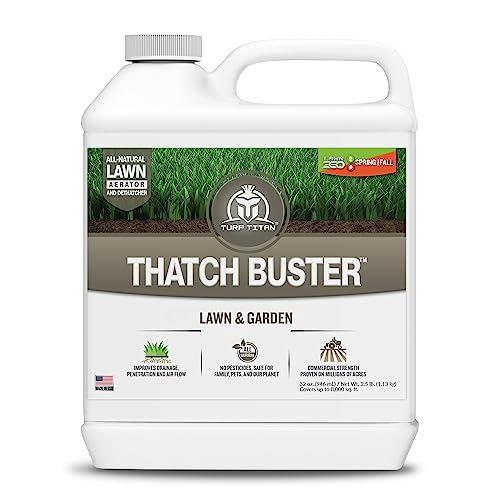
Another top pick by us is Thatch Buster by Turf Titan.
This soil-wetting product also does not contain surfactants. Rather, it contains 2 dozen strains of naturally occurring beneficial microbes that can naturally break down the compacted topsoil, also known as “thatch”, which will become nutrients for the grass.
It is safe for use on all grass types and can be applied directly on the lawn without aerating it with a machine or rake before application.
Customers have reported positive results on lawns, including clay, after a month of application.
This product is also better for reseeding grass, as you only need to wait 1 week, instead of a month like other products.
This product, however, does not contain added plant minerals like the one by Covington Naturals. For this, I give this product a 4.5/5
3. Penterra
Verdict: 3/5
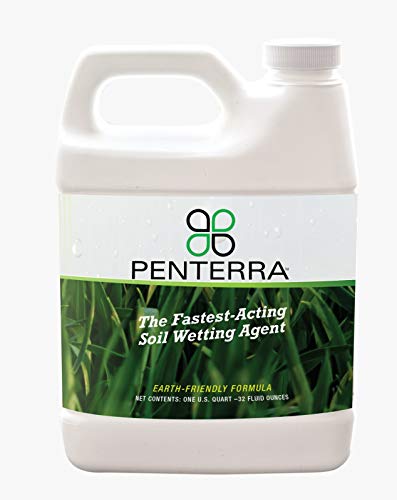
This product contains a blend of surfactants and works well to repair brown spots in the garden and improve water absorption in hydrophobic soils. However, Penterra does not disclose the active ingredients of its product.
This product generally has high ratings amongst customers, but it can be too strong for flowers and grass that has just sprouted.
Because of the lack of transparency with the ingredients, I give this product a 3 out of 5.
4. Yucca Wet
Verdict: 3.5/5

This product by GS plant foods contains natural surfactants or saponins extracted from the roots of a tree called Yucca Schidigera (not yuca as in cassava).
Yucca Schidigera is a small evergreen tree growing to 16 ft (5 meters) tall on rocky desert slopes in California, New Mexico, Nevada, and Arizona.
The advantage of this product is that it is organic and can be used in organic gardens.
However, some customers have pointed out that the product (advertised to contain 60% saponin concentration) is highly diluted with water because it is very watery and not as thick as other wetting products with only a 20% saponin concentration. It is thus considered overly priced compared to other products.
Overall, I give his product a 3.5/5
5. Simple Lawn Solutions
Verdict: 4/5

Simple Lawn Solutions Liquid Soil Looser contains 60% Ammonium Lauryl Sulfate as the surfactant, which is considered equivalent to shampoo.
This product is effective even with hard clay. It not only makes water thinner, it also improves and loosens the physical soil structure. When combined with water, it surrounds the soil colloid and slowly begins to separate its bond with other soil colloids.
Many customers have reported a positive impact on their lawn after a week or up to 2 months of application. It is proven to be safe for use around plants. But, after applying you should wait 30 days before planting new grass seeds or plant seeds.
It can also work together with mechanically aerating your soil or on its own.
Overall, I give this wetting agent a 4/5.
6. Coco-Wet (Spray-N-Grow)
Verdict: 3/5

Coco Wet is advertised as an organic product. However, the active ingredient listed is 90% modified Cocodiethanolamide.
Its non-ionic formula (neutral charge) is said to function as a surfactant to reduce the surface tension of water.
A problem with this product is that it is too small a bottle for use in a big area.
For this, I give this product a 3 out of 5.
7. Organic Liquid Humic Acid (GS plant food)
Verdict: 4/5

This product breaks down compacted soil organically with the help of beneficial microbes contained in humic acid.
The bottle says that it contains 80% humic acid. According to the manufacturer’s website, this product contains compost and Leonardite, which is produced by the natural oxidation of exposed lignite, low-grade coal.
However, many have doubted the percentage of humic acid in the product when comparing the color of the liquid with other similar products.
I give this product a 4/5.
How to apply wetting agents to my lawn?
Dilute the wetting agent per gallon of water (check the manufacturer’s label for the exact proportion). Then, apply it to your lawn using:
- A hand pump sprayer
- A back pump sprayer
- A hose attachment
Spray the diluted mixture directly onto your lawn, the soil, or the brown spots slowly. Most surfactants will foam up if water is poured onto them too quickly.
There is no need to dampen the soil or apply for more than one or two passes with a sprayer, or the equivalent with a hose attachment.
After applying the surfactant, give the area a light watering (but not too much) to help the surfactant penetrate into the top of the soil, and down into the soil profile.
When to apply wetting agents to my lawn?
In general, you want to avoid applying wetting agents in extremely hot conditions such as midday, when the sun is the strongest.
You also want to avoid spraying it onto your lawn, or soil when there are high winds. If you do, most of the wetting agents will blow away, and won’t get onto the lawn or soil.
The time of year is a factor, and you should aim to apply it in spring to give your soil or grass a boost before the hot summer months.
During the summer months, the soil is more prone to dry out. So, having your lawn in tip-top shape will help it survive and thrive.
Is it possible to apply too much wetting agent?
Too much wetting agent can damage plants.
An overdose can cause membrane permeability problems, ultimately causing disfigured, off-color, stunted plants with damage to leaves and roots. Temperature can affect how the plant reacts to a high dose of wetting agent.
It is important to follow the manufacturer’s dosage recommendations.
Related
6 Reasons Your Soil Doesn’t Absorb Water (Must Read!)
8 Proven Ways To Fix Hydrophobic Soil (Organically)
Should You Aerate Your Lawn? (Here’s The Proof)
References
Green, V. & Stott, Diane. (2001). Polyacrylamide: A Review of the Use, Effectiveness, and Cost of a Soil Erosion Control Amendment. Sustaining the Global Farm. 384-389.
Kumar Sootahar, M., Zeng, X., Su, S., Wang, Y., Bai, L., Zhang, Y., Li, T. & Zhang, X. (2019). The Effect of Fulvic Acids Derived from Different Materials on Changing Properties of Albic Black Soil in the Northeast Plain of China. Molecules, 24(8), 1535.
Czarnota M., & Thomas, P. (2013, Jan). Using Surfactants, Wetting Agents, and Adjuvants in the Greenhouse
- Keiki Paste vs Rooting Hormone:What’s the difference? - February 4, 2024
- Top 10 Orchid Fertilizers: A Comprehensive Review (2024) - February 2, 2024
- Top 8 Soil Inoculants For Stronger Plants (2024) - February 1, 2024

